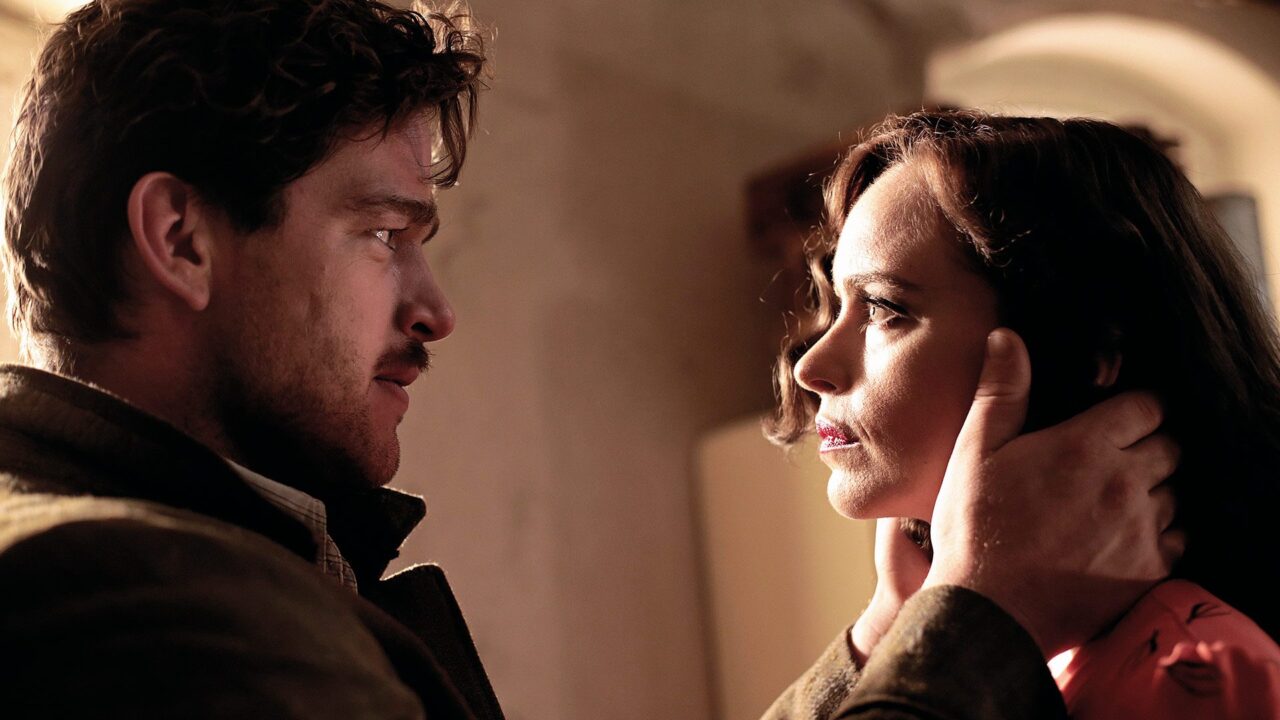The title of Phoenix, the newest film from German director Christian Petzold, can refer to many things. Most directly, it refers to the glowing red sign overhanging the entrance to postwar Berlin’s seedy American district. The word also carries connotations of rebirth, for the German nation, for the Jewish people, and for one woman.
That woman is Nelly Lenz, played by Nina Hoss, a holocaust survivor returning to Berlin in the wake of the war for facial reconstruction surgery. Accompanying her is Lene (Nina Kunzendorf), her Jewish friend mourning the loss of so many of her people. Unlike Nelly who prefers not to identify as Jewish, Lene doesn’t wish to return to German society and even finds it disturbing to see how others can carry on as if nothing has happened.
Recovering from the surgery that’s left her nearly unrecognizable, Nelly goes in search of her husband, knowing full well that he is almost certainly the one who betrayed her to the Nazis after years of successfully hiding from them. She wanders through the ravaged ruins of Berlin at night, when the streets are populated by crass soldiers and criminals. The journeys bring her to that American district, and eventually she sees her husband doing menial work at one of the nightclubs.
Phoenix is a film of restraint, and sometimes it suffers for showing less rather than more.
He no longer recognizes her, and she makes no attempt to properly identify herself. Soon, her husband Johnny (Ronald Zehrfeld) decides to use her for a convoluted but still somewhat plausible plan. He will train Nelly, who he knows only as Esther, to act, write, walk and speak like his wife Nelly, who he assumes is dead, so he can collect the $20,000 owed to her by the government.
Johnny is undoubtedly a monster for his past and even current actions, but Petzold and Zehrfeld are careful never to paint him as a villain. He is more a snake than anything, difficult to understand despite actions that speak for themselves, but he is a snake that has emotions and appears to carry some amount of guilt for his past.
Opposite him, Nina Hoss plays Nelly with the vulnerability of someone who has truly seen hell and back. The trauma she’s suffered is present in every shot wherein she appears, and it makes her act as a subservient to her traitor husband. She is a woman
Phoenix is a film of restraint, and sometimes it suffers for showing less rather than more. Petzold prefers to let certain aspects of Johnny and Nelly’s relationship remain enigmatic, and the same goes for Nelly’s concentration camp past. In a film that is in many ways about a woman and a people confronting their difficult past even as the rest of society appears eager, it’s a little puzzling why Petzold shies away from and even ignores some of this story’s more difficult aspects.
I don’t mean to say that he should have made a concentration camp film; Petzold is interested in Nelly’s recovery rather than her plight. He reconstructs postwar Berlin with rich details, using crisp gloomy light for daylight scenes and suggestive shadows and streetlights during night scenes. The costuming is similarly detailed, and the visual details are supported by those small narrative ones that subtly fill out the world of the film and its themes. People almost never ask about Nelly’s past in the concentration camps. It’s almost essential for a woman to carry a gun. Before one character commits suicide, they’re sure to write a letter of recommendation for a maid who will soon have to struggle for new work.
Nelly is a weak character, but understandably so, and Phoenix devotes its runtime to challenging her to move on from the past. Like so many people, she wants to recapture life before everything went wrong, and she suffers a difficult time before she can learn that she can’t go back. The parallels with the plight of the Jewish people seems clear, but Petzold doesn’t sacrifice his characters in service of allegory. His film is better for it.
Phoenix is now playing at Laemmle theaters in Los Angeles, Orange County, Pasadena, and Encino.
https://vimeo.com/104179101
Jeff Rindskopf
Jeff Rindskopf is a contributing writer for CINEMACY.

